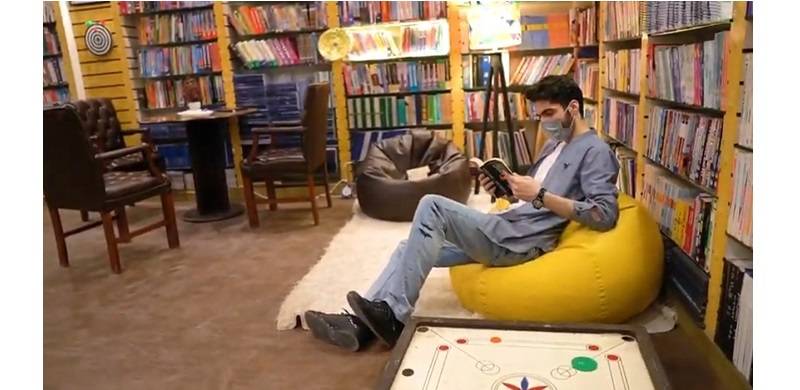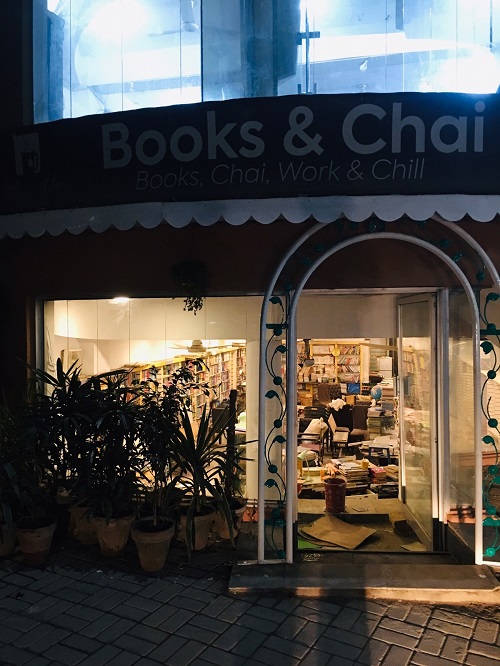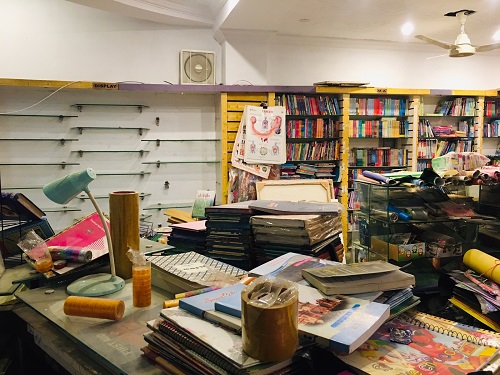
“What I say is: a town isn’t a town without a bookstore. It may call itself a town, but unless it’s got a bookstore, it knows it’s not foolin’ a soul.”― Neil Gaiman
Despite the crippling inflation in the past few years, the number of independent bookshops in the UK and Ireland has risen to a ten-year high in 2022. According to a report by the Guardian, almost 100 new bookshops have opened up in the UK in the past six years alone. Sadly, one sees the closure of bookstores every other day back home in our county. In the past ten years in Peshawar, around ten bookshops have been closed, including the famous Saeed Book Bank and more recently the London Book Company. Somewhat unsurprisingly, it has been the same years when extremism was on the rise in this province and thus it was most in need of opening up new bookstores.
Bookshops deliver not only words and ideas; they bring social and cultural capital to the towns and cities. However, Peshawar has been losing that capital with each passing year. Bookstores can play a crucial role in the mitigation of militancy and violent extremism in this part of the country. Nonetheless, the relevant authorities have focused largely on the security aspect of extremism, by taking steps to increase the security apparatus, while they have not paid similar attention to the socio-cultural factors that might offer the younger generations something more than just violence.
 The other day I decided to visit Books and Chai, a unique place that served tea, coffee, and a variety of thirty different cuisines from East and the West. Upon my arrival at the Books and Chai, I found out that the store has recently been closed for customers while the books were being unloaded from the shelves.
The other day I decided to visit Books and Chai, a unique place that served tea, coffee, and a variety of thirty different cuisines from East and the West. Upon my arrival at the Books and Chai, I found out that the store has recently been closed for customers while the books were being unloaded from the shelves.
To my pleasant surprise, I found the owner of the book-cafe, Mr. Bashir, who was busy looking into his accounts. I discussed with him the motivation behind the opening of this novel place, the rise and fall of his book-café and the steady decline in the number of book lovers in Peshawar. “The reason is straight and simple: Pashtuns don’t love books, period!” Mr. Bashir said. There was anger and frustration in his tone. His frustration was understandable, as he said he had suffered heavy financial losses for many months and finally, he gave up on his hope of spreading light in Pashtuns. “I have seen such book-cafes in foreign countries but not here. How did you come across this innovative idea?” I asked Mr. Bashir, who had formally studied engineering but was brought to the books business by his love for words and ideas. Mr. Bashir told me that the idea was carried home by his son from the US where he had been studying for his degree in Accounting.
When they opened the cafe in 2016, just after the violent civil unrest in the province, the initiative received a warm welcome from society. “Media personnel came for interviews so frequently that we became tired of them,” Mr. Bashir told me. In an area where extremism had reached a peak, Books and Chai was like an oasis in the desert. Available there were not only textbooks from primary to Master's level, but there were also general books collections, stationery, sitting places for a large number of people with charging sockets nearby and, of course, access to free Wi-Fi. Moreover, there was a prayer place inside the cafe as well.
“I am trying to know the reasons behind the continuous closure of independent bookstores in Peshawar and the impact it will have on our society” I asked. The disappointed owner of the departing book café told me that the reasons were not the clichéd mobile phones or online sales, because there were mobile phones in the US and the UK as well. It was not the soaring prices of books because the prices of fashion items had also increased, but you won’t see any fashion brand being closed. Instead, the fashion brands open up new outlets every few months in a new town. The sluggish and slothful sales of books were not the online business because Books and Chai launched online sales in 2017, two years before the pandemic pushed many businesses to cyberspace. “The only sensible reason is that our people don’t want to read books, not even the educated lot,” he asserted.
My personal observation backs up his claims to some extent. Schools and even universities try to keep students limited to specific textbooks and ready-made notes so that students could achieve high grades in their exams. They don’t expose students to the practice of conducting independent inquiries through exploring the printed world.
“Listen, son, you’re blaming inflation and poverty for the decline of bookshops here. Let me tell you something that might change your perspective,” said Mr. Bashir with sadness in his eyes. He then recounted his quest for obtaining information on the life and work of Haji sahib Turangzai, a great reformer from his native town of Charsadda during the 1947 Partition, who had inaugurated the historic Islamia College in Peshawar. It seemed that everyone has heard his name, but nobody knew anything about his struggle and services for the Pahtun community. Finally, Mr. Bashir found 15 copies of a book on the life and struggle of Haji sahib in an old bookshop, and he bought them all.
Bashir gifted the copies of the book to his well-educated friends and asked them to collect some money to republish the now-extinct book and make it available to the new generation. He also planned an annual lecture in memory of Haji Sahib Turangzai at Islamia College, Peshawar, where students and the general public would know about their great leaders.
Nevertheless, his plea fell on deaf ears. “I’m not sure if my friends have read the free book that I sent them,” said the white-bearded owner with a deep sigh. He let his heavy-framed spectacles hang loose on his chest from the string attached; rubbed his eyes with his fists and threw a weary glance at the workers who were busy unloading books from the shelves.
It was getting late; prayer leaders were making calls to the maghrib prayer; the darkness was overpowering the light like the fashion brands were engulfing bookstores in Peshawar. The lemon-coloured Qahwa in the small, white, bowls-like cups resembled the colour of the exhausted face of the bookseller.
I left the disappearing book café with images of some former independent bookshops of Peshawar flashing in my mind: Shaheen Books on University Road - now a pharmacy; Idara-e-Farough-e-Taleem (Institute for the Dissemination of Education) in Liaqat Bazaar - now a hosiery store; Discount Book Centre in Bilour Plaza - now a mobile shop; Royal Book Bank in Stadium Chowk - now Ghazi Biryani; Jambo Bookshop - now an ice-cream bar; Maktaba-e-Sarhad in Khyber Bazaar - now an electronic store. The list was never-ending.
I never recalled a new bookstore being opened in the past ten years in Peshawar that deals in the sale of general books.
Despite the crippling inflation in the past few years, the number of independent bookshops in the UK and Ireland has risen to a ten-year high in 2022. According to a report by the Guardian, almost 100 new bookshops have opened up in the UK in the past six years alone. Sadly, one sees the closure of bookstores every other day back home in our county. In the past ten years in Peshawar, around ten bookshops have been closed, including the famous Saeed Book Bank and more recently the London Book Company. Somewhat unsurprisingly, it has been the same years when extremism was on the rise in this province and thus it was most in need of opening up new bookstores.
Bookshops deliver not only words and ideas; they bring social and cultural capital to the towns and cities. However, Peshawar has been losing that capital with each passing year. Bookstores can play a crucial role in the mitigation of militancy and violent extremism in this part of the country. Nonetheless, the relevant authorities have focused largely on the security aspect of extremism, by taking steps to increase the security apparatus, while they have not paid similar attention to the socio-cultural factors that might offer the younger generations something more than just violence.
 The other day I decided to visit Books and Chai, a unique place that served tea, coffee, and a variety of thirty different cuisines from East and the West. Upon my arrival at the Books and Chai, I found out that the store has recently been closed for customers while the books were being unloaded from the shelves.
The other day I decided to visit Books and Chai, a unique place that served tea, coffee, and a variety of thirty different cuisines from East and the West. Upon my arrival at the Books and Chai, I found out that the store has recently been closed for customers while the books were being unloaded from the shelves.To my pleasant surprise, I found the owner of the book-cafe, Mr. Bashir, who was busy looking into his accounts. I discussed with him the motivation behind the opening of this novel place, the rise and fall of his book-café and the steady decline in the number of book lovers in Peshawar. “The reason is straight and simple: Pashtuns don’t love books, period!” Mr. Bashir said. There was anger and frustration in his tone. His frustration was understandable, as he said he had suffered heavy financial losses for many months and finally, he gave up on his hope of spreading light in Pashtuns. “I have seen such book-cafes in foreign countries but not here. How did you come across this innovative idea?” I asked Mr. Bashir, who had formally studied engineering but was brought to the books business by his love for words and ideas. Mr. Bashir told me that the idea was carried home by his son from the US where he had been studying for his degree in Accounting.
When they opened the cafe in 2016, just after the violent civil unrest in the province, the initiative received a warm welcome from society. “Media personnel came for interviews so frequently that we became tired of them,” Mr. Bashir told me. In an area where extremism had reached a peak, Books and Chai was like an oasis in the desert. Available there were not only textbooks from primary to Master's level, but there were also general books collections, stationery, sitting places for a large number of people with charging sockets nearby and, of course, access to free Wi-Fi. Moreover, there was a prayer place inside the cafe as well.
“I am trying to know the reasons behind the continuous closure of independent bookstores in Peshawar and the impact it will have on our society” I asked. The disappointed owner of the departing book café told me that the reasons were not the clichéd mobile phones or online sales, because there were mobile phones in the US and the UK as well. It was not the soaring prices of books because the prices of fashion items had also increased, but you won’t see any fashion brand being closed. Instead, the fashion brands open up new outlets every few months in a new town. The sluggish and slothful sales of books were not the online business because Books and Chai launched online sales in 2017, two years before the pandemic pushed many businesses to cyberspace. “The only sensible reason is that our people don’t want to read books, not even the educated lot,” he asserted.

My personal observation backs up his claims to some extent. Schools and even universities try to keep students limited to specific textbooks and ready-made notes so that students could achieve high grades in their exams. They don’t expose students to the practice of conducting independent inquiries through exploring the printed world.
“Listen, son, you’re blaming inflation and poverty for the decline of bookshops here. Let me tell you something that might change your perspective,” said Mr. Bashir with sadness in his eyes. He then recounted his quest for obtaining information on the life and work of Haji sahib Turangzai, a great reformer from his native town of Charsadda during the 1947 Partition, who had inaugurated the historic Islamia College in Peshawar. It seemed that everyone has heard his name, but nobody knew anything about his struggle and services for the Pahtun community. Finally, Mr. Bashir found 15 copies of a book on the life and struggle of Haji sahib in an old bookshop, and he bought them all.
Bashir gifted the copies of the book to his well-educated friends and asked them to collect some money to republish the now-extinct book and make it available to the new generation. He also planned an annual lecture in memory of Haji Sahib Turangzai at Islamia College, Peshawar, where students and the general public would know about their great leaders.
Nevertheless, his plea fell on deaf ears. “I’m not sure if my friends have read the free book that I sent them,” said the white-bearded owner with a deep sigh. He let his heavy-framed spectacles hang loose on his chest from the string attached; rubbed his eyes with his fists and threw a weary glance at the workers who were busy unloading books from the shelves.
It was getting late; prayer leaders were making calls to the maghrib prayer; the darkness was overpowering the light like the fashion brands were engulfing bookstores in Peshawar. The lemon-coloured Qahwa in the small, white, bowls-like cups resembled the colour of the exhausted face of the bookseller.
I left the disappearing book café with images of some former independent bookshops of Peshawar flashing in my mind: Shaheen Books on University Road - now a pharmacy; Idara-e-Farough-e-Taleem (Institute for the Dissemination of Education) in Liaqat Bazaar - now a hosiery store; Discount Book Centre in Bilour Plaza - now a mobile shop; Royal Book Bank in Stadium Chowk - now Ghazi Biryani; Jambo Bookshop - now an ice-cream bar; Maktaba-e-Sarhad in Khyber Bazaar - now an electronic store. The list was never-ending.
I never recalled a new bookstore being opened in the past ten years in Peshawar that deals in the sale of general books.

